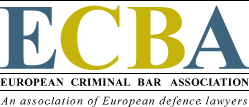Since its foundation in 1997 the ECBA (European Criminal Bar Association) has become the pre-eminent independent organisation of specialist defence lawyers in all Council of Europe countries.
The ECBA aims to promote the fundamental rights of persons under investigation, suspects, accused and convicted persons.
The ECBA consists of specialist defence lawyers in the member countries of the Council of Europe. Membership is open to all lawyers, whether practicing or in academic life, who support those aims.
The association holds conferences twice a year, in spring and autumn, during which members and non-members meet and discuss the latest developments in European criminal law. The ECBA acts as a platform for lawyers to meet with lawyers from all member states and to exchange information and knowledge. Its website aims to give access to relevant information, laws, treaties and preparatory documents. Lawyers can find colleagues they need in member-state countries in the 'Find a Lawyer' section. There are also possibilities to take part in projects and working groups.
Although being wholly independent the ECBA has close links with the CCBE, and the ICB.
Supra-national bodies, such as the European Union, are increasingly influencing the future of criminal justice in Europe. Therefore, we believe, there is a strong need for an organisation of practising defence lawyers able to advocate rights and minimum standards for all suspected, accused and convicted persons.
I hope that this website provides the information you are looking for. If you require any additional information, don't hesitate to contact theThis email address is being protected from spambots. You need JavaScript enabled to view it.
Vincent Asselineau
Chair of the ECBA
ECBA activities include:
- Making observations and representations on proposed legislation, particularly EU legislation.
- Acting as a consultant to European institutions including making contribution to expert meetings and discussions.
- Providing a platform for practitioners to debate and highlight short-comings in either European or domestic legislation, compared to best practice and universal fundamental rights standards.
- Assisting members in accessing readily all sources of European law including innumerable international treaties and covenants.
- Establishing a network of contacts to provide mutual assistance.
- Organising conferences twice a year to present and discuss current issues relevant to European criminal law.
- Liaising with other international and domestic lawyers groups including CCBE and ICB.




